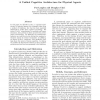Free Online Productivity Tools
i2Speak
i2Symbol
i2OCR
iTex2Img
iWeb2Print
iWeb2Shot
i2Type
iPdf2Split
iPdf2Merge
i2Bopomofo
i2Arabic
i2Style
i2Image
i2PDF
iLatex2Rtf
Sci2ools
AAAI
2006
2006
A Unified Cognitive Architecture for Physical Agents
In this paper we describe Icarus, a cognitive architecture for physical agents that integrates ideas from a number of traditions, but that has been especially influenced by results from cognitive psychology. We review Icarus' commitments to memories and representations, then present its basic processes for performance and learning. We illustrate the architecture's behavior on a task from in-city driving that requires interaction among its various components. In addition, we discuss Icarus' consistency with qualitative findings about the nature of human cognition. In closing, we consider the framework's relation to other cognitive architectures that have been proposed in the literature.
| Added | 30 Oct 2010 |
| Updated | 30 Oct 2010 |
| Type | Conference |
| Year | 2006 |
| Where | AAAI |
| Authors | Pat Langley, Dongkyu Choi |
Comments (0)

